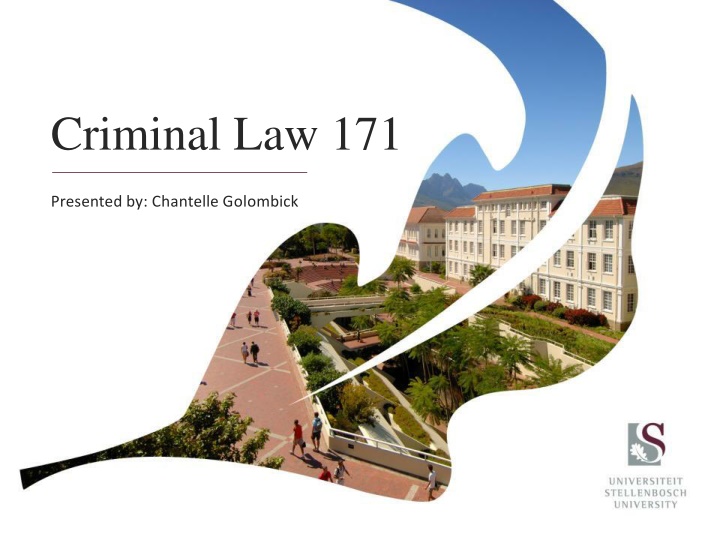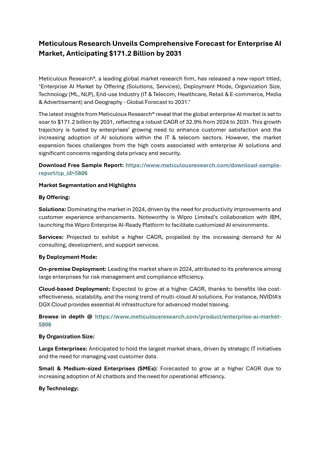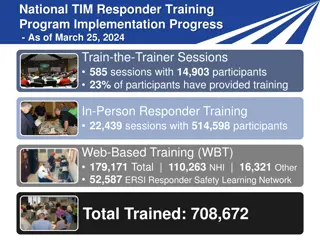
Criminal Law Research: Methods, Aims, and Argument
This informative content covers key aspects of conducting criminal law research, including formulating research questions, methodology, introduction writing, and crafting a strong argument. It emphasizes the importance of clear aims, effective methodologies, and well-supported arguments in legal research.
Download Presentation

Please find below an Image/Link to download the presentation.
The content on the website is provided AS IS for your information and personal use only. It may not be sold, licensed, or shared on other websites without obtaining consent from the author. If you encounter any issues during the download, it is possible that the publisher has removed the file from their server.
You are allowed to download the files provided on this website for personal or commercial use, subject to the condition that they are used lawfully. All files are the property of their respective owners.
The content on the website is provided AS IS for your information and personal use only. It may not be sold, licensed, or shared on other websites without obtaining consent from the author.
E N D
Presentation Transcript
Criminal Law 171 Presented by: Chantelle Golombick
Technical Presentation Arial 12 1,5 line spacing Normal margins (2,54cm) 0,5 indentation No line spaces between headings and paragraphs or between subsequent paragraphs Footers Arial 10, single line spacing Out of text quotations Arial 11, single line spacing, 0,5 indentation http://blogs.sun.ac.za/legalwriting/files/2015/02/Starter-Pack- 2015.rar
Research question and aims Research question: What is the particular question that the research will address? A strong research question should pass the so what test. Think about the potential impact of the research you are proposing. What is the benefit of answering your research question? Who will it help (and how)? these are your aims. Refer to your guidelines: Aims = want to achieve with the research. What do you want to (or need to) do in this project? What points do you want to prove? What debates would you like to analyse? What aspects of the law/issue/debate do you want to discuss?
Methodology What methods are you going to use to answer your research question? o What sources are you going to consult? o How are these sources going to assist you to answer your research question? o Are they the most appropriate, up to date and academic sources relevant to your topic? o What approach are you going to adopt to analyse and evaluate your materials? E.g. critically analyse, comparative study?
Introduction The primary purpose of an introduction is not to summarise the content of your paper. The purpose of an introduction is simply to explain to your reader what you are writing about as well as the legal context within which your discussion takes place. This could include some background to your research and setting out the research problem. Consider the topic on the South African legal position regarding euthanasia: o What is the current position, what happened that we want to write about this and in what context will we be writing?
Formulate an argument Before you start, ensure that you know exactly what point you want to prove you can only do this if you understand your question. Consider the various reasons why your point of view is the right one, and very important find proof for those reasons. Proof can be found in legislation and case law - Do not summarise! Look at footnotes / bibliography in case law. Ask yourself whether the judgment is contradictory, whether it is in line with previous case law, whether it rests upon the best possible interpretation of the relevant legal principles, the Constitution (or other legislation)
Analyse case law Identify the parties Plaintiff / Defendant of Applicant / Respondent. Read the headnote of the case this will indicate the main legal points argued Read the judgment at the end - reasons. Now that you have a basic understanding of the legal points of the case and the outcome, read carefully through the complete judgment. Make sure you can explain what was decided, by whom (e.g. was it a majority), was there a minority (dissenting) and most importantly the reasoning for the judgment. Apply the reasoning to your argument.
Conclusion Briefly outline the structure of your central argument. Provide an answer to your research question. Page 38 of the Writing Guide / Bladsy 34 van die Skryfgids
Plagiarism You should reference / acknowledge a source when you: o summarise the main idea of an entire work in your own words; o paraphrase a source s idea(s) or words; o use verbatim words / sentences from sources in addition to acknowledging your sources in this instance, you also need to place double quotation marks around the verbatim words or sentence(s) in the text where they appear. As a rule, you should always remember that whenever words or ideas are borrowed from sources such as books, magazines, newspapers, songs, movies, websites, etcetera, the author s work must be acknowledged by including an appropriate reference. NB: http://blogs.sun.ac.za/legalwriting/writing-guide/
Dankie Thank you Enkosi






















